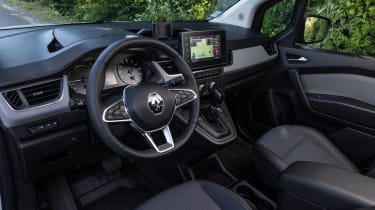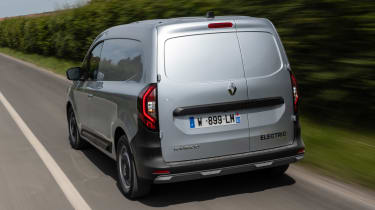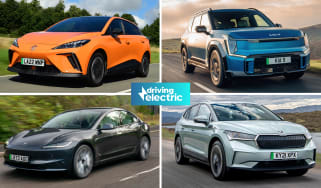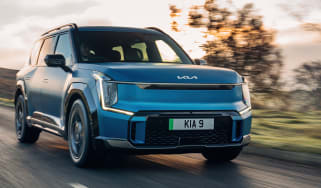New 2022 Renault Kangoo E-TECH electric van: prices and specifications
All-new version of Renault’s compact electric van starts from £33,055
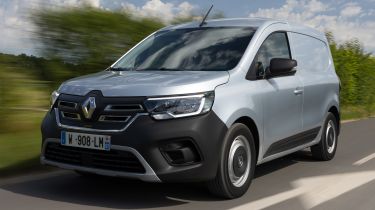
The third-generation Renault Kangoo electric van is now available to pre-order. Now known as the Kangoo E-TECH in line with the rest of the brand's electrified models, the van gets a claimed range of up to 186 miles and starting price just over £33,000.
There are two trim levels to choose from – Start and Advance – both available in two body lengths. Standard kit on the entry-level Start includes sliding load doors, rear barn doors that can open up to 180 degrees, a full steel bulkhead, heated seats, a heated windscreen, a 3.5-inch display for the instrument panel, a heat pump, a Type 2 charging cable and cruise control. The Kangoo E-TECH also gets Renault’s Z.E. Voice, which is a sound the van emits at low speed for pedestrian safety.
Stepping up to the Advance trim costs £1,200, but adds an eight-inch central central touchscreen, Apple CarPlay and Android Auto connectivity, 18-inch alloy wheels, wide-view mirrors and reversing sensors. There’s also a crew-van version of the Kangoo E-TECH with seating for five, but that’s only offered in Start trim.
Other luxuries offered in the compact electric van include wireless charging, adaptive cruise control and hands-free parking, plus blind-spot warnings and intervention, driver attention alert, high-beam assist and lane-keeping assist. It's also available with three front seats with a central folding backrest that turns into a mobile office, along with almost 60 litres of storage in the cab.
Speaking of practicality, the Kangoo E-TECH loses no load space compared to its diesel-engine counterpart, thanks to the batteries being mounted in the van's floor. Cargo volume in the regular model stands at 3.3 cubic metres, payload is 600kg and towing capacity is 1,500kg. The extended-wheelbase version boosts load volume to 4.2 cubic metres and load length from 1.8 to 2.2 metres, but payload and towing capacity remain the same.
The Kangoo E-TECH gets a 45kWh battery for a range of 186 miles, according to Renault, and faster charging than the outgoing Kangoo Z.E. At the Kangoo E-TECH’s maximum charging speed of 80kW, Renault says you can add over 100 miles of range in around 30 minutes. Plug the van into a 7.4kW home wallbox and a full charge will take just under seven hours, but if you go for the optional 22kW charger, a 15-80% top up takes 90 minutes.
The new Kangoo E-TECH is powered by a 90kW electric motor, with peak torque of 245Nm. Exact performance figures haven't been issued, but Renault has detailed the three regenerative braking modes available to drivers. B1, also known as 'sailing', keeps the regenerative effect to a minimum and is most suited to motorway or faster road driving. B2 is the default mode, designed to mimic the sensation of taking your foot off the accelerator in a petrol or diesel-engined van, while B3 ramps up the effect to the full, for use in heavy traffic or on steep roads.
Through Renault's smartphone app or the on-board Easy Link infotainment screen, owners can programme and schedule battery charging, remotely monitor the battery level, pre-heat or pre-cool the passenger compartment, search for charging stations along the route, or calculate which destinations are accessible with the remaining battery level.

Order books will officially open on 1 September, with first customer deliveries expected in October, at which point the Kangoo E-TECH will go up against a wide array of small electric-van competitors, including its sister models the Nissan Townstar and Mercedes eCitan, plus the Stellantis Group’s Citroen e-Berlingo, Peugeot e-Partner, Fiat E-Doblo and Vauxhall Combo-e Cargo quartet.
Recommended
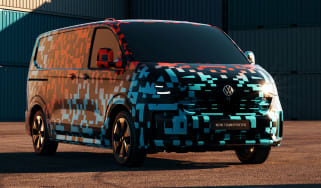
New Volkswagen eTransporter arrives to much van-demonium
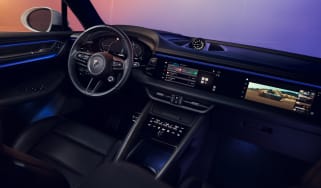
Porsche Macan EV: BMW iX rival gets Taycan-inspired interior
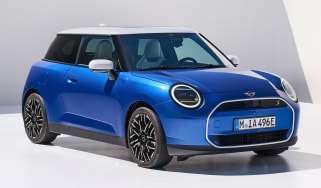
MINI Cooper Electric: pricing and specs for British-built electric supermini
Most Popular
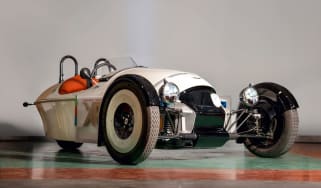
Morgan Super3 XP-1 is an electric three-wheeler

MINI Cooper Electric: pricing and specs for British-built electric supermini

